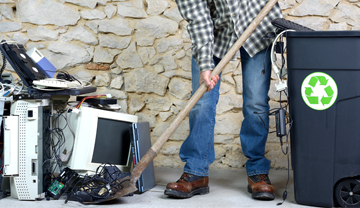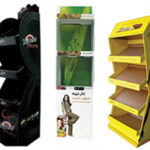In an effort to continuously remain green, Lebanon-based UNIPAK takes initiative to manage electronic waste (e-waste) that poses threat to the environment and community.
With technology changing in a blink of an eye, the product life cycle of an electronic device has shortened immensely and products are becoming obsolete very quickly. This brings to question the proper methods to dispose of electronic waste (e-waste). In line with INDEVCO Paper Containers division environmental initiatives, member UNIPAK has taken the initiative to set in place e-waste management practices.
Discarded, obsolete, or defective electrical equipment and appliances, known as e-waste, can leak toxic substances into the environment and pose a threat to the environment and human health. UNIPAK’s e-waste management practices are in collaboration with Beeatoona, a non-governmental organization (NGO) working with communities to promote environmental awareness and sustainable efforts throughout Middle East and North African (MENA) region.
UNIPAK E-Waste Management Practices
UNIPAK identified key e-waste generated by the Halat-based plant and offices, as well as the main contributing departments, IT and Maintenance. The corrugated packaging manufacturer generates e-waste including PCs, computer mice, keyboards, printers, copiers, laptops, electric and network cables, USBs, batteries, electronic boards, screens and electrical motors and drives.
UNIPAK organized e-waste collection according to type to be sent to Beeatoona:
- Used Batteries: UNIPAK placed a battery recycling bin with the store keeper to gather all used batteries. New batteries are only given in exchange of old batteries, to ensure that no batteries are thrown away or disposed of in an incorrect manner.
- Electronics: UNIPAK collects all used electronic boards and screens from its plant, as well as all IT generated waste (computer mice, keyboards, printers…) into one location.
- Electrical Cables: UNIPAK sends all electrical cables for recycling with local companies in Lebanon.
Beeatoona, in turn, takes charge of sending UNIPAK e-waste with that of other regional companies to an e-waste recycler in Europe.
About E-Waste
Used electronic products are the most rapidly growing problem in the waste stream due to quantity and toxicity. Most electronic devices contain contaminants, such as lead, phosphors, mercury, cadmium, lithium, brominates flame retardants and PVC plastics. When disposed of, e-waste can leak these toxic substances which cause damage to the environment and harm to human health.
Large companies are main contributors to e-waste through discarding of outdated office electronic equipment. Companies must balance the need to remain on-top and in-tune with technological advancement in growingly competitive market, while adhering to their social responsibility to remain environmentally-conscious.
ABOUT UNIPAK
UNIPAK is a member of INDEVCO Paper Containers, a division of the multinational INDEVCO Group.





